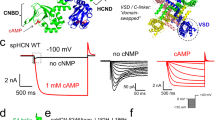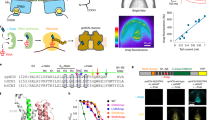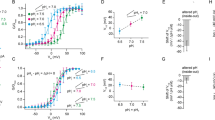Abstract
Until now the only reported effect of depolarization on the intracellular pH (pHi) of excitable cells is an acidification of the cell cytoplasm1,2. It seems unlikely that this could be a direct effect of membrane potential because pHi is known to be regulated by an electroneutral mechanism3,4 and in most cells H+ ions are not in equilibrium with the membrane potential (Em). In any case the membrane conductance to H+ ions would be expected to be small because they are at such low concentrations on either side of the cell membrane. But it is possible that the H+ ion permeability of the membrane increases on depolarization just like that of other ions in the bathing medium (Na+, K+ and Ca2+ for example). To test this idea we have made pHi measurements on molluscan neurones under voltage-clamp. Our findings, presented here, provide evidence for a large increase in H+ ion permeability in depolarized cells. We suggest that this increase in proton conductance may be the basis for the ‘nonspecific’ currents previously described in perfused molluscan neurones5,6 and we assess the physiological significance of this newly discovered pathway.
This is a preview of subscription content, access via your institution
Access options
Subscribe to this journal
Receive 51 print issues and online access
$199.00 per year
only $3.90 per issue
Buy this article
- Purchase on Springer Link
- Instant access to full article PDF
Prices may be subject to local taxes which are calculated during checkout
Similar content being viewed by others
References
Ahmed, Z. & Connor, J. A. J. gen. Physiol. 75, 403–426 (1980).
Abercrombie, R. F. & Roos, A. J. Physiol., Lond. 319, 65P–66P (1981).
Thomas, R. C. J. Physiol., Lond. 273, 317–338 (1977).
Roos, A. & Boron, W. F. Physiol. Rev. 61, 296–434 (1981).
Kostyuk, P. G. & Krishtal, O. A. J. Physiol., Lond. 270, 545–568 (1977).
Byerly, L. & Hagiwara, S. J. Physiol., Lond. 322, 503–528 (1982).
Thomas, R. C. Ion-Sensitive Intracellular Microelectrodes (Academic, London, 1978).
Thomas, R. C. & Cohen, C. J. Pflügers Arch. ges. Physiol. 390, 96–98 (1981).
Thomas, R. C. J. Physiol., Lond. 201, 495–514 (1969).
Thomas, R. C. J. Physiol., Lond. 255, 715–735 (1976).
Meech, R. W. & Thomas, R. C. J. Physiol., Lond. 298, 111–129 (1980).
Thomas, R. C. J. Physiol., Lond. 296, 77P (1979).
Mitchell, P. & Moyle, J. Biochem. J. 104, 588–600 (1967).
Hagiwara, S. & Byerly, L. A. Rev. Neurosci. 4, 69–125 (1981).
Doroshenko, P. A., Kostyuk, P. G. & Tsyndrenko, A. Ya. Neirofiziologiya 10, 645–653 (1978). (Translated in Neurophysiology 10, 470–477; 1978).
Colquhoun, D., Neher, E., Reuter, H. & Stevens, C. F. Nature 294, 752–754 (1981).
Author information
Authors and Affiliations
Rights and permissions
About this article
Cite this article
Thomas, R., Meech, R. Hydrogen ion currents and intracellular pH in depolarized voltage-clamped snail neurones. Nature 299, 826–828 (1982). https://doi.org/10.1038/299826a0
Received:
Accepted:
Issue Date:
DOI: https://doi.org/10.1038/299826a0
This article is cited by
-
Role of the Voltage-Gated Proton Channel Hv1 in Nervous Systems
Neuroscience Bulletin (2023)
-
Multiple mechanisms contribute to fluorometry signals from the voltage-gated proton channel
Communications Biology (2022)
-
Role of the voltage-gated proton channel Hv1 in insulin secretion, glucose homeostasis, and obesity
Journal of Physiology and Biochemistry (2022)
-
pH and male fertility: making sense on pH homeodynamics throughout the male reproductive tract
Cellular and Molecular Life Sciences (2019)
-
The inhibition of voltage-gated H+ channel (HVCN1) induces acidification of leukemic Jurkat T cells promoting cell death by apoptosis
Pflügers Archiv - European Journal of Physiology (2017)
Comments
By submitting a comment you agree to abide by our Terms and Community Guidelines. If you find something abusive or that does not comply with our terms or guidelines please flag it as inappropriate.



